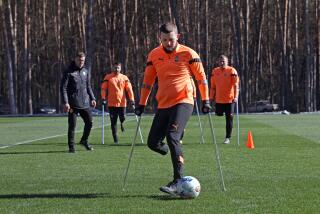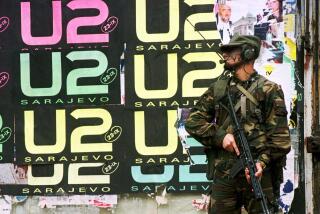War a Surreal Backdrop for Soccer Tour
- Share via
WEST HILLS — Tanks, guns, politicos and pundits grace--or disgrace--the living room television of the Gotovac family of five, via a CNN satellite. For two minutes of each half-hour, as always, the conflagration in the former Yugoslavia has been transmitted into their American home.
As if struck by mortar fire, conversation wilts, halts, dies. All eyes focus on the talking head, the bearer of bad news, as it describes the newest offensive, the most recent evacuation, the latest shattered promise of peace. The segment ends. Conversation recommences, resurrected for 28 minutes before collapsing again.
Just as Yugoslavia has.
And Miljenko Gotovac, born in Split when Yugoslavia was one nation, doesn’t need Ted Turner’s network to tell him so.
From June 21 to July 16--thanks to contributions from the Croatian community in Southern California--the coach was there, amid the crumbled Roman Catholic churches, the tourist-bare resort towns and glass-strewn streets, accompanied by five other chaperons and 22 soccer players (ages 16 to 19) with Croatian ancestry. Half had been there before, in more peaceful times.
Together, the Young Croatian Soccer Club--most from San Pedro, some from the San Fernando Valley--toured much of Croatia, dipping briefly into the scorched terrain of Bosnia-Herzegovina, playing soccer, meeting mayors, eating, drinking, carousing.
Just a well-struck goal kick away, the shelling continued, even escalating after Gotovac returned to California at tour’s end while many players stayed to visit relatives. Then it began touching areas that had offered the team safe passage a week prior.
In the Balkans, nowhere is completely safe. But that isn’t all the coach anticipates his team will take away from a trip that was two years in the making.
“It was a great success, playing soccer with top teams, getting such a great reception, all for $500 for a 24-day tour,” Gotovac said. “The kids are going to remember that trip as long as they live. They may never be treated like that again.”
The war didn’t stop for these amateur soccer players any more than it did for United Nations edicts. But the Croatian people did, pampering the Young Croatian Soccer Club--which won but once--as if the presence of fresh, American faces was a temporary panacea for seemingly incurable ills.
Scribes chronicled them daily. Dignitaries dined them nightly. Citizens embraced them warmly.
Said Simon Zanki of San Pedro: “We didn’t expect them to make such a big deal about us, considering the war.”
*
June 21-24
A girl is killed in Sarajevo, Bosnia-Herzegovina, when a rocket slams into a crowd waiting in line for water.
*
Quite a welcoming committee.
The plane landed, and Nikica Valentic, the Croatian prime minister, and officials of the Croatian Soccer Federation were there.
“The players were overwhelmed,” Gotovac said.
After staying two nights in the resort city of Tuheljske Toplice, the team toured the Croatian Presidential Palace in Zagreb, the Croatian capital, as guests of the Soccer Federation.
“We were treated with respect,” said Simon Zanki’s cousin, co-captain Ivan Zanki of Garden Grove.
The first sobering tour passed through the city of Okucani in Western Slavonia, which had been liberated from Serbs in May after four years. Thousands of Serbs were forced to flee.
Still, said Michael Gotovac: “Every Croatian home, every Roman Catholic church, it seemed, was burned to the ground.”
The first match was in Cernik, where the team enjoyed another in what would be many banquets in city halls. Young Croatian Soccer Club beat Cernik, 2-0, its lone victory during the tour.
Said Domagoj Gotovac, Miljenko’s Americanized 19-year-old son: “It was like beating the Clippers, and thinking you can sweep the Rockets.”
But it was worth remembering.
“Our first game was in a small village,” Simon Zanki said. “It was out of a story. It was raining, right next to a farm. People from the village were just standing there, watching us.”
*
June 25-July 2
Mortar attacks in Sarajevo kill four children. A rocket slams into the headquarters of national and foreign broadcast press, another into a high-rise building--killing five more. Bosnia’s government decides to no longer deal with U.N. envoy Yasushi Akashi. Over the first weekend of July, 19 civilians in Sarajevo are reported dead.
*
Fresh from an encouraging effort--though still a 1-0 loss--against highly regarded Soccer Club Croatia, Miljenko Gotovac and his young Americans traveled to what he considers the most beautiful city on the Adriatic Sea: Opatija, site of the 43rd Kvarnerska Rivijera tournament.
Sixteen teams entered--four foreign--and none as short on seasoning as the U.S. entrant.
It showed: 6-0, 2-0, 5-1.
“In the first [match], half the team was sick, with injured legs, stomach pain, high fever,” Miljenko Gotovac said. “You could see right away they were out of it.”
Even the press said the officiating was awry, noting that at least three Orijent goals were scored when a player was offsides.
Dozens of newspaper and television representatives would approach players before and after each contest, probing them for insights, which Domagoj Gotovac was likely to provide, even though the attention surprised him.
Miljenko Gotovac brought another son, Matija, along to film the trip, but Domagoj--who has done modeling auditions--didn’t mind the additional air time: “It was cool getting on camera so much.”
Said Ivan Zanki: “They made us feel like we were a real big thing.”
As big as they were, subjects of greater import dwarfed them.
“All they talk about over there is politics,” Miljenko Gotovac said. “The war, the horror stories, are on everyone’s mind.”
What is Clinton doing? Why the arms embargo? How can the French and English do so little?
So a couple of offsides goals could be quickly forgotten, particularly since Orijent would later win the tournament championship.
The Young Croatian Soccer Club recovered to play respectably in the second match, a 2-0 loss to Osijek, a Croatian power, then faltered in the second half of the third, as a 1-1 halftime tie with Zrinski of Bosnia-Herzegovina became a 5-1 defeat.
Opposing teams had more experience than Miljenko Gotovac’s squad. They also, Gotovac grudgingly concedes, may have had more sleep.
“At 10:30, I’d come into the hotel, and everyone’s there,” Miljenko Gotovac said. “But that’s because the discos don’t open until midnight, and don’t close until 5.”
Ivan Zanki said the soccer part of the trip was a learning experience, competing against so many quality clubs.
“We were there for a soccer purpose,” said Ivan Zanki. “But you couldn’t pass up all the fun.”
The players also blamed the constant travel and mayor-meeting for their field weariness, particularly late in the excursion.
Lingering in Opatija for closing ceremonies, the team wasn’t too tired to parade with both American and Croatian flags, to raucous cheers.
*
July 3-7
vl,2
Bosnian Serb gunners, after pummeling U.N. convoys with anti-aircraft weapons, attack the helicopter of European Union peace mediator Carl Bildt. The 38-month-old siege on Sarajevo continues. More die.
*
The charter bus left for one badly damaged city, Zadar, then three days later, for another, Sibenik. Neither had been occupied by Serbs during the war, but each had taken heavy shelling.
In the interim, the team dropped two matches and viewed the wreckage of three-plus years of discord.
“All the shipyards, the factories are closed,” Miljenko Gotovac said. “People go to cafes, but don’t buy anything. They order water, and sit back for hours and drink it, because they don’t have money to pay for it.”
Said Ivan Zanki, who has been to Croatia several times: “The war changed many things. Not everything is as pretty as it was. People’s attitudes have changed. They are happy that they got freedom, but it brought a lot of bitterness.”
*
July 8-16
vl,2
Bosnian Serb forces capture the designated U.N. “safe area” of Srebrenica, capturing peacekeepers and forcibly expelling thousands of refugees. Another enclave, Zepa, comes under attack. It would fall July 19.
*
Miljenko Gotovac left Split for Germany in 1964, when he was 21, and earned a living washing dishes. Three years later, aided by a Catholic relief agency, he relocated to California, where he began a career as a bartender.
His family--mother, brother and sister--stayed.
The coach visited them as his team visited island resorts, most of which teemed with refugees. He rejoined them for a match against another tough opponent, Hajduk.
Another loss, 7-0.
Safety had not been a major concern thus far, with most of the fighting far to the south and east. But that would change. The next stop was Dubrovnik. And by July 10, the Serbs were bombarding its airport.
But the team, assured that all was fine, went anyway. And all was fine, except of course for another defeat, this one 4-2.
A five-hour trip to Medjugorije, in Bosnia-Herzegovina, followed.
“It’s the city where the Virgin Mary was supposed to have appeared,” Miljenko Gotovac said.
No spirits surfaced. No games were left. Time to go home.
*
After the coach and five players returned to America, several players, including his son and the Zankis, remained in the Balkans to visit relatives.
They were still there when the Croatian army went on its own offensive, capturing Knin--a Serbian stronghold--in the Krajina region, and when Bosnia parked its troops just outside Dubrovnik.
On Aug. 4, the morning before Simon Zanki left, the American Embassy in Zagreb warned U.S. citizens to leave Croatia, particularly the areas of Split, Dubrovnik, Zadar, Sibenik and Karlovac.
The Young Croatian Soccer Club had been in four of five.
Even so, Domagoj Gotovac did not return until Aug. 13. He would have preferred to stay until Aug. 25, and gone straight from Croatia to USC, where he is a sophomore.
“I would like to move to Croatia when I have some money,” Domagoj, an electrical engineering major said. “Every European country needs fixing. That one is going to need a lot of fixing.”
It is the top of the hour. Conversation halts. Domagoj’s mother, Milojka, turns up the television’s volume. Her son seems to be right.
More to Read
Go beyond the scoreboard
Get the latest on L.A.'s teams in the daily Sports Report newsletter.
You may occasionally receive promotional content from the Los Angeles Times.







